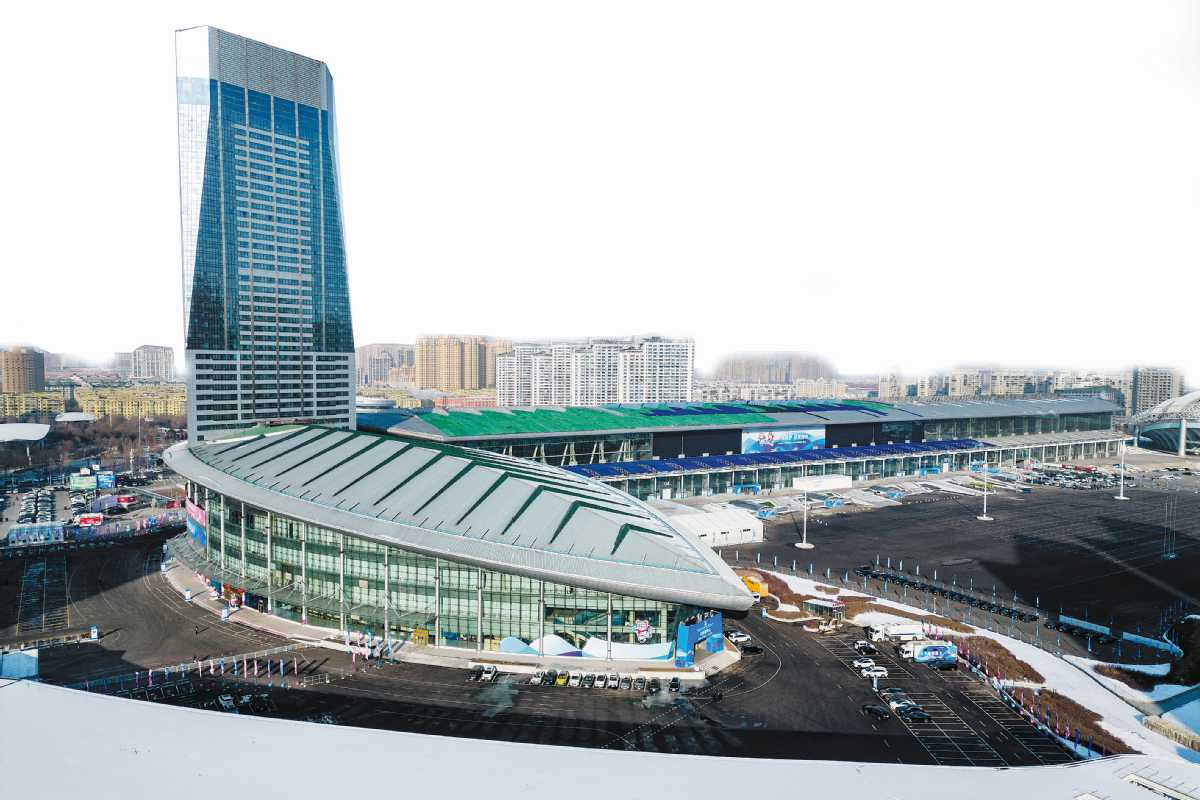
The newly renovated and upgraded Huaqi Hotel in Harbin, which serves as the Athletes' Village for those contesting the ice sports competitions in the city's downtown area, welcomes around 900 athletes and officials for the 9th Asian Winter Games. XINHUA
Since its official operation on Jan 31, the newly renovated and upgraded Huaqi Hotel in Harbin, Heilongjiang province, has welcomed around 900 athletes and officials for the 9th Asian Winter Games, which are set to begin on Friday night.
The hotel, located in the same complex as the Main Media Center and the venues for the opening and closing ceremonies, serves as the Athletes' Village for those contesting the ice sports competitions in the city's downtown area.
Built in 2005, the hotel has 41 floors and 625 rooms.
In preparation for the Games, it underwent a comprehensive renovation, including the replacement of the elevators.
The restaurant is adorned with decorations and murals themed around the Games, as well as the beautiful winter scenery of Heilongjiang.
In the athletes' rooms, welcome cards, mascot cutouts and traditional folk art pieces were prepared ahead of their arrival.
"The standard rooms are equipped with two beds measuring 1.2 meters by 2 meters," said Chen Jin, director of the guest room department. "We have also prepared bed extensions to accommodate the height of some of the taller athletes."
During the Spring Festival period, the rooms and public areas were decorated with Chinese New Year motifs like the Chinese character "fu", which symbolizes good fortune, to create a festive atmosphere.
To meet the diverse dietary needs of athletes from across Asia, Wang Gang, the hotel's executive chef, along with his colleagues, has prepared over 100 dishes, offering a variety of flavors to cater to different culinary requirements.
"We have nutrition-rich Western dishes on the menu, such as steak and pasta," said Wang. "There are also unique flavors from Southeast Asia and delicious Chinese dishes, including local specialties such as guobaorou (sweet-and-sour pork or beef), chicken stewed with mushrooms, and Harbin sausages, all tailored to meet the nutritional needs of athletes during high-intensity competition or training."
In the restaurant, a visual management system displays information such as water usage in the kitchen and dish retention.
"The system can show whether there are flies in the kitchen, monitor kitchen staff, and other conditions, primarily ensuring the dining safety of athletes," said Wang. "Additionally, the system can provide information on dish retention, energy management and risk event statistics."
During the Games, a clinic in the Athletes' Village will also provide medical support for competitors.
With departments including internal medicine, a surgery and a pharmacy, the clinic has multiple rooms tailored to the needs of athletes and is equipped with electrocardiograms and ultrasound machines.
"There are dozens of medical staff members from the hospitals affiliated with Harbin Medical University and Heilongjiang University of Chinese Medicine," said Pan Yu, manager of the clinic. "Many doctors on the team have studied abroad, so they can integrate international methods and advanced medical concepts into daily diagnosis and treatment, providing athletes with cutting-edge medical services."
Considering that athletes urgently need relaxation and recovery after high-intensity competition, the clinic has added traditional Chinese medicine procedures, such as acupuncture, massage and other traditional therapies, to help athletes relieve fatigue and quickly recover from the rigors of competition.
As one would expect, the Athletes' Village also has a fully equipped gym, and even a licensed merchandise retail store.
Serene surroundings
Meanwhile, the snow sports athletes are also well catered for at their accommodation in Yabuli.
The serene surroundings of the Avaunce Hotel provide an ideal place for the athletes to rest and prepare for their competitions.
The exterior decoration of the hotel adopts a modern minimalist style that harmonizes with its natural surroundings.
The Games' mascots Binbin and Nini, a pair of cute Siberian tigers, have been placed on either side of the hotel's main entrance to welcome guests.
With a celebratory atmosphere created by the Games, and decor to match, the lobby features a spacious lounge area, providing a comfortable environment for athletes and coaches to relax and hang out.
To ensure that athletes can dine promptly after competition, a storage area for skis and other large snow sports equipment is located next to the restaurant.
The restaurant has been divided into multiple areas to meet the dining needs of athletes from different countries and regions.
Additionally, the restaurant emphasizes nutritional balance to ensure that athletes receive sufficient energy support during competition.
There are meeting rooms, clinics, office areas and a language service center to provide athletes with one-stop assistance during their stay.
The hotel has over 230 standard rooms, along with double rooms and triple rooms, to meet the accommodation needs of over 500 people.
"All staff at our hotel will provide Asian Winter Games athletes with a warm and comfortable home full enthusiasm and professional service," said Liu Guangpeng, deputy general manager of the Yabuli Tourism Investment Group. "We will spare no effort to ensure that every athlete can enjoy the best rest and preparation during the Games."
Contact the writer at zhouhuiying@chinadaily.com.cn
TIAN XUEFEI and ZHOU HUIYING in Harbin